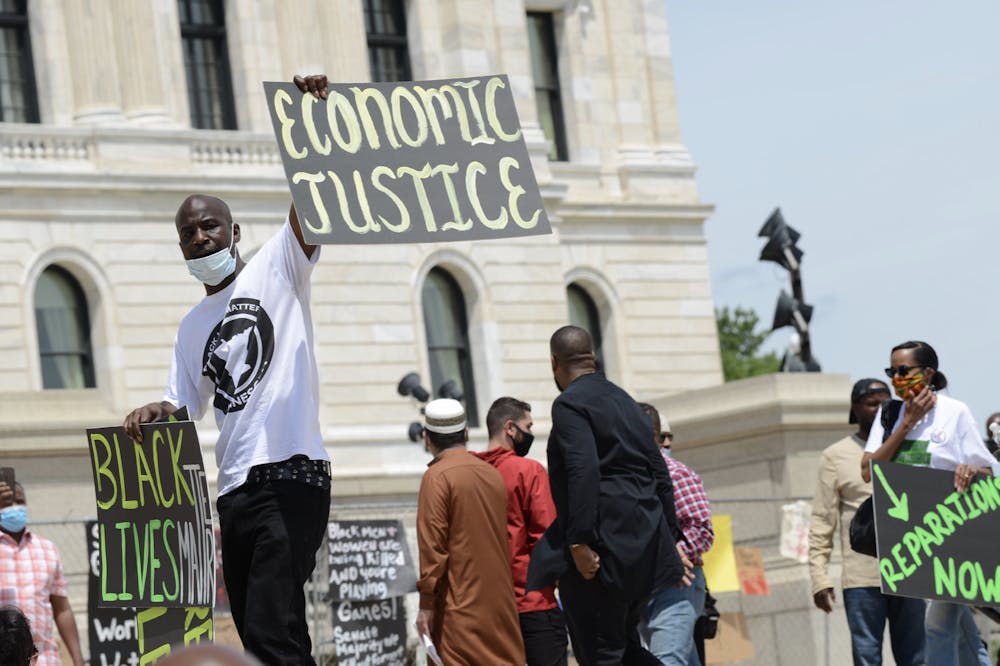Reparations for Black American descendants of persons enslaved in the United States would have decreased COVID-19 transmission for Black Americans and the population as a whole, according to a new study conducted by a team of researchers, including William A. (“Sandy”) Darity Jr., Samuel DuBois Cook professor of public policy.
Reparations are being considered as a way to ameliorate the inequalities—including Jim Crow laws, hyper-incarceration, redlining, lethal policing and unfair housing and credit markets—that Black Americans have endured over the past several centuries due to legacies of slavery, said Eugene Richardson, Trinity ‘99. Richardson is lead author of the study and assistant professor of global health and social medicine at Harvard Medical School.
As chair of the Lancet Commission on Reparations and Redistributive Justice, Richardson has spent the past two years working with other researchers worldwide to analyze evidence of the benefit of reparations and create recommendations for policy change. The goal of the study on COVID-19 and reparations was to analyze “what effect reparations paid five or 10 years ago would have had on COVID-19 transmission in the U.S.,” Richardson said.
Motivation for the study came from the concern that researchers “who use mathematical models for infectious disease don't incorporate things like inequality and social justice,” said James Holland Jones, associate professor of earth system science at Stanford University and one of the study’s authors.
The study used Louisiana as a model largely due to the availability of COVID-19 data disaggregated by race and census data on overcrowding. Louisiana also has one of the highest rates of income inequality in the country: Black Americans in Louisiana live in significantly more overcrowded housing than white populations and are much more likely to perform frontline work, Richardson said.
“The fundamental difference between black and white Americans is one of wealth,” Jones said. “Wealth is something that's accumulated over lineages and translates into things like property and housing.”
The researchers designed a mathematical simulation to model the effects of reparations having been said 10 years ago, which if “suitably executed'' would have eliminated the racial wealth gap: the average Black household would have at least $840,000 more in net worth, according to Darity.
As a result, Black Americans “would not have been compelled to take low paid jobs requiring significant personal contact deemed essential” and “would have been able to obtain better quality housing, particularly less crowded housing, thereby further reducing the likelihood of infection,” Darity wrote.
The simulation predicted that this redistribution of wealth would have led to a 30% to 60% decrease in COVID-19 transmission across the entire population. Reducing transmission in the highest risk group reduces transmission throughout the entire population, Richardson said.
Moreover, reparations that generated greater balance in housing and risk from frontline work between Black and white Americans would have benefited everyone, not just descendents of enslaved persons. To put it simply, “it's good for society to have less inequality,” Jones said.
Richardson explained that while the moral and historical reasons for supporting reparations already hold significant weight, public health-based rationale can provide an objective and topical basis that is invaluable in its own right.
COVID-19 regulations such as social distancing and wearing masks “do nothing for the disparity,” explained Richardson. “We wanted to actually promote the idea that there should be racial justice interventions included when people are doing things like pandemic containment.”
This multifaceted perspective, which Richardson refers to as “pandemicity,” has “provided a mechanism for people to start to understand the interconnectedness of humanity.”
“And when people start to think about that, sometimes it encourages them to see the inequities and to maybe intervene on them,” he explained.
Given the controversial nature of reparations talks, however, Richardson’s hope has been counterbalanced by criticism from those opposed to related policy change. The study was discussed in mainstream media, and both Richardson and Jones mentioned that the researchers received hate mail, especially after a feature on CNN.
“Possibly the biggest insight that I've had from this work [is that] Sandy Darity and our other Black collaborators deal with this bullshit every single day of their professional lives,” said Jones. “Every single time they write something that is science-based, factually based, data-based about the nature of structural inequality, their email inboxes are filled with hate mail.”
Despite the criticism, Darity remains hopeful that this study has opened the door to future discussions regarding reparations and real change.
“The exciting thing about the present moment is the fact that there is a growing national conversation on a topic that, in the past, frequently was deemed outside the bounds of serious consideration,” Darity wrote.
House Resolution 40 was introduced in 1989 with the intention of establishing a federal commission on reparations. However, it was not until this past April that a House committee voted to move the bill forward.
Get The Chronicle straight to your inbox
Signup for our weekly newsletter. Cancel at any time.

